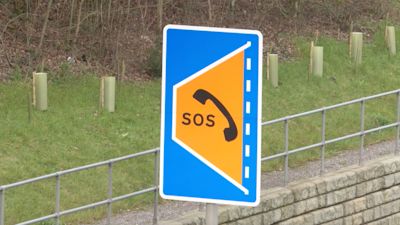Recovery workers at 'breaking point' as they claim authorities are taking an unfair share of cash

Tap to watch a video report by ITV News Meridian's James Dunham
Recovery workers who remove broken down vehicles that are causing a danger to other road users, say they're at 'breaking point'.Local companies have told ITV News Meridian, they have concerns that the money they receive for carrying out work, as part of a contract they have with police, has been decreasing year on year.'It's been breaking for a generation' one operator told us anonymously. 'Recovery operators are trying to sustain their business but are not receiving their funding', Under legislation introduced in 2008, certain vehicle recovery companies pay a management fee to be given jobs through the police. It involves removing vehicles from motorways and A-roads, after they have been invoilved in accidents.
Vehicle operators have a specific contract with police
The car owner would often be charged £150 but recovery operators say the police and management are now taking up to 60% of that fee with them earning on average, £75 per job.That's compared to £95 before the legislation was introduced 13 years ago.'Demoralised'"Owners are feeling demoralised because the police have contributed to a race to the bottom. How they pay us has been an excuse to have more revenue.', the operator tells us."Staff are not recognised, they are demoralised, they should be in the same bracket as emergency workers, even more so because these are the guys who are more often to be at the scene than the emergency services. Yet we arrive without the protection and financial reward. It's been a downward spirit and we're at breaking at point.
"The authorities have increased their income on the back of these statutory charges. As well as car charges, there are other segments in the fee matrix. "So a heavy vehicle that’s shed its load on the motorway would incur a fee of £6,000, the authorities take up to about £1500 as an income generator for that process when their involvement would be just a phone call to organise a recovery."The work has got more difficult, the finances are making it more difficult to operate. How long do the authorities want to do this before their whole recovery network disappears? The authorities need to stop otherwise there will be no industry to support them going forward."
Bob Hunt experienced issues with his contract covering the M25,M3, M23 and A23 ten years ago.
His Surrey based business faced the prospect of storing vehicles on behalf of the police effectively for nothing.
"What they did do was insist on free storage, free facilities etc and that just was set to get worse and worse up until the last contract we gave up.
"I cannot understand how a police force can be paid to do something and then expect us to pay for that facility because that's what it's costing us.
"One facility on its own is £1,200 rent a year and that would've been solely theirs for nothing."'They deserve more'
Sam Cockerill backs calls for recovery workers to receive more money
Sam Cockerill is part of the 'Smart Motorway Kills' group and the 'Campaign for Safer Roadside Rescue and Recovery'.In 2017, three months into his role as a recovery worker, Sam's partner Steven Godbold was on a job on the M25 near Sevenoaks.He died after being hit by a lorry with Sam backing calls for recovery workers to receive a fairer share of money.
The Government say the UKs roads including smart motorways are some of the safest in the world and, when it comes to breakdown charges, it has consulted with the industry on increasing the charge to drivers.A Home Office spokesperson said,"Police charges for vehicle recovery avoid costs being borne by the taxpayer and allow the police to remove vehicles to enforce the law, and to protect motorists and other road users from potential obstructions and dangers."The Government ran a targeted stakeholder consultation to review the current charges, and to gather evidence to ensure that fees are adequate to meet the current costs and operational needs for a sustainable vehicle recovery service. We wrote to a range of stakeholders in May to inform them of the consultation, and we will continue to listen to their views."Recovery workers fear their share won't go up and any increase in charge to the vehicle owners will go to the authorities as they send out their own SOS.